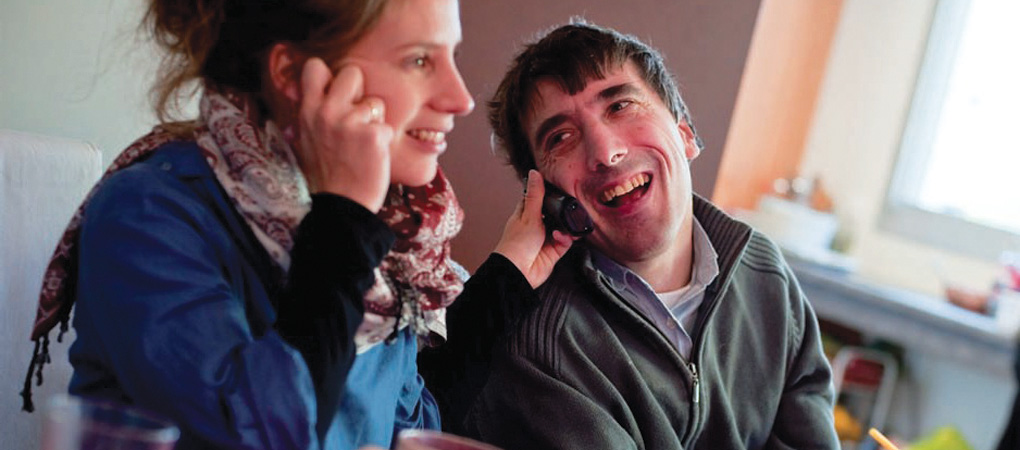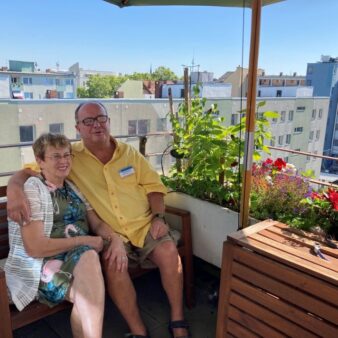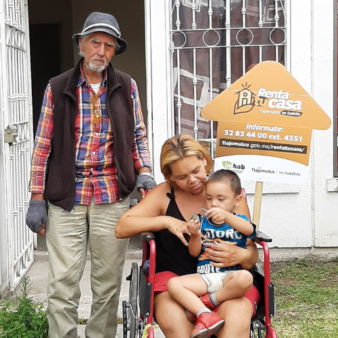Project Description
Aims and Objectives
This project aims to promote, implement and manage well-located, affordable and inclusive homes, accommodating both disabled and non-disabled residents. It seeks to strike a balance between independent living, social inclusion and supportive housing for disabled adults.
Context
Thanks to medical advances, some 10,000 individuals a year in France are able to survive serious accidents. However, following such life-changing events, they are led to live with severe disabilities, and often suffer from isolation and a loss of sense of identity as they have fewer opportunities for interacting with others. Due to the complexities of the disabilities, life can be very difficult both for the person affected and their family and moving forward once life has been turned upside down is an emotional and socio-economic challenge for all concerned. Institutional communal housing is the typical provision for those unable or unwilling to be cared for by their families, but they can also be placed in psychiatric hospitals or in long-term hospital care. These solutions did not fit the needs or desires of those disabled persons who wanted to live in their own homes. With the introduction of a new law in 2005 favouring the development of personal dignity and residences, many disabled people gained access to their own apartment, but found that living alone can lead to isolation and social exclusion. One person in four now lives alone in Paris, and the most fragile have become increasingly excluded.
Key Features
The Association Simon de Cyrène (ASC) was originally established in 1996 by a group of people who had all gone through the life-changing experience of suddenly having to live with a severe disability – both those living with the disability and their able-bodied family and friends – and was granted charitable status in 2004. It is currently developing into a federation, with the original group forming an umbrella association.
Following the passing of the 2005 law on disabled individuals’ rights with an attached funding stream, ASC was able to develop, promote and manage shared, well-located and affordable rental housing solutions for adults who became severely disabled following head trauma or an accident. This shared home approach was inspired by Jean Vanier’s L’Arche communities which provide care for those with mental disabilities from birth.
Disabled residents share the house with non-disabled volunteer helpers and a paid house administrator. Each person has his/her own studio apartment with bathroom, kitchenette and access to the communal spaces, which allow all residents to invite their friends and relatives. Disabled residents are provided with medical and social care by a team of professionals. Communal life is also actively promoted, through the sharing of daily tasks and leisure activities within the shared homes, as well as through the organisation of activities and events open to residents of the broader neighbourhood. Disabled residents participate in the organisation and management of communal life within the shared homes, as well as in the governance of the broader ASC organisation.
ASC shared homes are not seen as the solution to a problem, but rather as a signal to society: they reveal the richness of ‘otherness’ and difference and allow disabled people to take their place in society. Although the inspiration for ASC work has come from a Christian tradition, all social backgrounds, cultures and religions are welcome.
The development of an ASC community is demand-driven, with an individual house being established by those with disabilities and their friends and families, who form themselves into a local association. The ASC umbrella association is in charge of providing support to these local associations wanting to set up similar projects. The development of an ASC community further relies on collaboration with multiple partners, including private sponsors, foundations and social investors; government actors; civil society organisations working in the field of disability providing social and technical expertise and actors providing ASC with a pool of trained and supported volunteers. Private social and health services agencies provide disabled residents with additional specialist care.
The first community was opened in 2009 in Vanves, near Paris, and is in the form of a single apartment block accommodating 67 residents, including 35 disabled residents and 32 non-disabled volunteers. Since then, a house has been opened in Toulon (2010), which includes apartments for six disabled persons and six non-disabled persons; and in La Rochelle (2011) which has a capacity of 12 persons, used for providing short holidays for ASC residents. ASC ultimately seeks to develop communities comprising four to six large houses grouped in the same area, accommodating approximately 70 persons.
What impact has it had?
- The project impacts primarily on the well-being of disabled residents, allowing them to live in safe and healthy environments, surrounded and supported by others, whilst enhancing their right to self-determination. It helps their families to move on from the person they knew before the accident to the person their loved one has or will become.
- The project has an important financial impact for disabled residents and their families, as well as for French taxpayers, as accommodation in an ASC community is highly affordable as compared to independent life or life in specialised institutions.
- Non-disabled residents are given the opportunity to gain a meaningful human and professional experience.
- Residents of the wider neighbourhood in which the shared homes are located are invited to participate in various activities and events, contributing towards a more inclusive society.
- The approach is part of and contributes to broader debates about the rights of disabled people, in the context of an emerging political awareness regarding the risks of isolation to vulnerable populations such as disabled adults. The region Ile de France has recently passed a new law facilitating the development of shared housing solutions for disabled and non-disabled people, and several political promises to pass a similar law on a national level were recently made.
How is if funded?
The investment budget of each local project relies on a mix of one third subsidised housing loans, one third public subsidy, and one third private investment and ASC’s own funds. Care provision is funded by a variety of public welfare payments for the residents (approximately US$1,180/month). Rent and food costs, and the salary of the house administrator, are also met by welfare benefit payments. Each disabled resident has US$460 per month for their own use after all bills are met, rather than US$130 if living in an institution. Families are not required to make a contribution to costs.
The social activities are financed through private donors and foundations, through a generous government incentive scheme, whereby one dollar donated becomes 10 dollars due to tax relief, matching public subsidy and loans. The loan borrowed from the “Caisse de Depots”, a national bank, has to be repaid in 50 years, with repayments coming from rental payments. ASC raised US$5.2 million between 2006 and 2010 from foundations, private donors and corporate donors, and plans to raise US$1.3 million a year until 2018.
Why is it innovative?
- ASC places disabled individuals at the centre of their own development and promotes their right to self-determination.
- Shared homes including both disabled and non-disabled adults represent a significant social innovation within the context.
- Communities are open to the outside, allowing for their inclusion in the wider local community.
- ASC promotes an integrated approach to housing for disabled individuals, encompassing leisure activities, health and care services, support in daily life and enhanced access to urban amenities.
What is the environmental impact?
The shared homes built to date are all certified “HQE” (High environmental quality). Forty per cent of the electricity used in the established homes is produced via solar panels and with very high levels of insulation, allowing energy costs to be kept low.
Being well-located and well-connected to the rest of the city, ASC shared homes are highly accessible and encourage the use of public transport or walking for daily mobility.
Is it financially sustainable?
The costs of living in an ASC community are calculated based on an estimation of the individual resources of an adult receiving disability and housing benefits, and are affordable even to disabled residents with limited incomes. After covering typical expenses (such as rent, administration, meals, care and support), disabled adults living in an ASC community are left with more money per month than those living in specialised institutions (US$460 per month as opposed to US$130 in an institution). The pooling of resources moreover significantly contributes to making life in ASC communities more affordable than life in individual flats.
Sustainable employment opportunities have been created with 30 long-term jobs generated for administrators and paid helpers to date.
Properties are often acquired or rented at below market value due to philanthropic support by an individual or a social housing body, or gifted as in the case of La Rochelle.
The project mainly relies on public funding, which is vulnerable to reductions particularly in the current economic context, and remains in need of sustained private investments. This is not perceived as a problem, however, since with a high profile ASC has been able to double its fundraising income year on year.
What is the social impact?
Shared homes allow for the development of a communal way of life whereby meals, chores and daily tasks, as well as leisure activities and social outings, can be shared. They are also meant to be open to the outside: activities and events are organised for neighbourhood residents and families and friends to come by. Their central location furthermore enhances disabled residents’ access to urban amenities, commercial facilities and social networks. This leads to a decreased sense of exclusion for disabled adults, strengthening their social skills and abilities, as well as allowing them to find their place as part of a broader community.
There has been a decrease in the level of psychiatric and psychological intervention needed over time. Behavioural disorders reduce as social ties increase, and being able to exercise choice allows people to flourish. Surveys show that 95 per cent of ASC residents want to continue to live in an ASC home, whereas 95 per cent of residents living in an institutional setting want to leave it.
ASC volunteers and employees gain valuable skills and experiences in the field of disability, and are provided with training and support in this respect. The spiritual dimension of life in the community houses is important but not proselytised, and religious choices are welcomed and supported.
Barriers
- There have been political and administrative barriers to using a shared home approach, shared accommodation having been seen as an inferior solution to having a separate apartment.
- Technical standards and regulations have also represented an important challenge, particularly as ASC seeks to implement shared homes in or near city centres.
- Accessing well-located land, in the context of important land pressures in central urban areas, is a key challenge, both in terms of availability and cost.
Lessons Learned
- It is much longer and harder to initiate projects and innovate with a social purpose compared to a private business.
- Fear of disability is deeply ingrained in some people, making it harder for people to see the person apart from the disability. This can be a challenge to the mainstreaming of the shared homes approach.
Evaluation
Trial periods allowing prospective residents to experience communal life in the first shared house developed by ASC have allowed for the monitoring of the approach. A systematic evaluation matrix has also been designed and is currently in use in order to evaluate the impact of the ASC model on its residents.
Transfer
ASC and its founder’s work benefit from wide media coverage and strong political support. ASC won the “Concours Impact Habitat” in 2011 for social entrepreneurship and its founder received the title of “Chevalier de la Légion d’Honneur” for his work. ASC’s work has furthermore been widely disseminated via four books written by its founder, as well as documentaries, conferences, and the successful film “Intouchables” which tells the story of ASC’s honorary president who became disabled after an accident.
The first ASC community, Vanves, was opened in 2009, with two others completed in 2010 and 2011. Local projects are currently underway in Angers, with the completion of the first house expected in 2013 and three others in the next three years. Associations have been established in Nantes and Bordeaux with a view to developing houses in 2014/2015. Overall, and to date, local groups have been set up in ten cities: Rungis, Issy les Moulineaux, Angers, Nantes, Bordeaux, Toulon, Marseille, Dijon, La Rochelle, and Poitiers. ASC aims to develop 16 communities in the course of the next ten years. A detailed provisional budget has been prepared in this respect, as well as a review of financial options. Ultimately, ASC aims to develop a community in each city of over 100,000 inhabitants in France, as well as disseminating its approach internationally.
This scaling up process is supported through the development of a federal model, with the federation supporting the development of local ASC associations (before, during and after the development of a local project) and promoting the ASC values and approach. ASC is currently seeking partnerships in Asia, Africa and South America in the view of facilitating international transfer.



